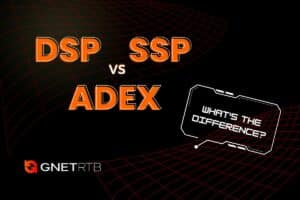A Data Management Platform (DMP) is a centralized system for collecting data from different sources. It serves as a reference for analysis, especially in the field of marketing.
Read on to learn more about DMPs and how they are important in the programmatic media ecosystem.
What is a Data Management Platform (DMP)?
A DMP is a type of database management system (DBMS). These platforms collect and organize data in a coherent manner to meet the needs of marketing professionals.
Furthermore, it is also used in the application of Business Intelligence (BI) methods in digital content to score customers, evaluate campaigns, etc. All of this is to assist in decision-making through its monitoring dashboards.
DMPs collect structured and unstructured data from internal and external sources and then integrate and store it. The integrated data can be primary, secondary (data from partners, distribution networks, etc.), or third-party (data external to the organization and its partners, resold by experts to supplement the first two sources).
Why are Data Management Platforms important?
In the marketing industry, DMPs allow for more effective exploration of customer data to better understand them. In fact, they are used more frequently to improve decision-making in marketing campaigns and media buying.
They aggregate, analyze, organize, and segment data by customer types or “audience” based on location, income, browsing habits, and purchases made. For publishers and advertisers, this means that partnering with Ad Networks, SSPs, and Ad Exchanges integrated with a DMP is more advantageous. After all, campaigns will be more assertive, which represents more revenue for the publisher and advertisers satisfied with maximizing Return over Investment (ROI).
How does a Data Management Platform work?
For a DMP to work, algorithms need to analyze audience segments to identify potential customers (those with profiles similar to the company’s existing customers) who will be the right targets for marketing campaigns.
This data is used to personalize campaigns and engage potential consumers. DMPs allow for a more objective evaluation of performance in different audience segments and across different media channels at the end of campaigns. This contributes to the decision about future marketing and advertising investments.
By managing a very large amount of data, a DMP is one of the pillars of Big Data applied to media buying, as when used by specialists, it contributes to campaign targeting and advertising optimization.
What is the difference between DMP and DSP?
DMPs work in conjunction with Demand-Side Platforms (DSPs). They are complementary, but should not be confused.
DSPs are used to auction advertising space through Real-Time Bidding (RTB). They connect media buyers and many advertising markets and automate programmatic advertising offers and purchases in real-time.
DMPs provide segmented audience data to DSPs, which send targeted ads to the audience.
A DMP is responsible for analyzing segmentation results and informing the DSP about how the audience is responding to the campaign. The DSP uses this information to refine its bids and advertising targeting efforts.
Conclusion
In short, the main objective of a Data Management Platform (DMP) is to provide a unique and centralized platform where all data can be managed and analyzed in one place. This allows for a broad understanding of each advertiser’s audience and directs the ad to the right content at the right time.
DMPs are an essential technology in the programmatic media ecosystem, as they contribute to maximizing Return over Investment (ROI) in advertising, helping marketing professionals create more effective and targeted advertising campaigns.
Finally, if your brand or agency has an experienced in-house team, you may want to check out GnetRTB, an SSP with its own technology Ad Exchange integrated with Navegg, the leading DMP in the industry . Access this link and be served by our specialized team.




